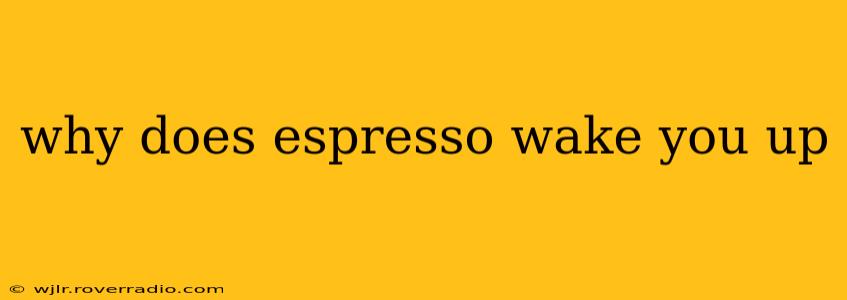Espresso, that concentrated shot of coffee magic, is renowned for its ability to jolt you awake and sharpen your focus. But why exactly does it have such a potent effect? The answer lies in the caffeine it contains, and the way our bodies react to this powerful stimulant.
How Does Caffeine Work?
The primary reason espresso wakes you up is its high caffeine content. Caffeine is a central nervous system stimulant. This means it acts on the brain and body to increase alertness and energy levels. It achieves this by blocking adenosine, a neurotransmitter that promotes relaxation and sleepiness. By inhibiting adenosine, caffeine effectively increases the levels of other neurotransmitters like dopamine and norepinephrine, which lead to feelings of increased energy, focus, and improved mood.
Is Espresso Stronger Than Other Coffee?
While espresso itself doesn't contain more caffeine than a comparable amount of brewed coffee (e.g., a double espresso contains roughly the same amount of caffeine as a 12oz cup of drip coffee), its concentrated nature means you consume a larger dose of caffeine in a smaller volume. This concentrated delivery leads to a quicker and more noticeable boost in alertness. The faster absorption rate contributes significantly to the perceived "kick" from espresso.
How Much Caffeine is in Espresso?
The caffeine content in espresso varies depending on the type of beans, roast, grind, and brewing time. However, a typical single shot of espresso contains approximately 63mg of caffeine, while a double shot contains around 126mg. This amount can differ slightly between coffee shops and home brewing methods.
How Much Caffeine is Too Much?
Individual sensitivity to caffeine varies greatly. Some people can tolerate higher doses with minimal side effects, while others experience anxiety, jitters, or insomnia even with small amounts. Pay attention to your body's response to espresso and adjust your intake accordingly. Excessive caffeine consumption can lead to several negative health consequences.
Does Espresso Have Other Stimulants Besides Caffeine?
While caffeine is the primary stimulant in espresso, other compounds contribute to its overall effect. For example, espresso contains small amounts of theobromine and theophylline, which are also stimulants, although less potent than caffeine. These compounds can contribute to the overall feeling of alertness and energy, though to a lesser extent than caffeine.
Can Espresso Affect Sleep?
Consuming espresso too close to bedtime can significantly disrupt sleep patterns. The extended half-life of caffeine means its effects can linger for several hours. If you're sensitive to caffeine, it's recommended to avoid espresso in the afternoon or evening to avoid sleep disturbances.
What are the Alternatives to Espresso for a Wake-Up Call?
If you're looking for alternatives to espresso for a morning boost, consider other caffeinated beverages like tea (especially green or black tea), or even exploring caffeine-free options such as a brisk walk, a cold shower, or a healthy breakfast.
In conclusion, espresso's ability to wake you up stems primarily from its high concentration of caffeine, which quickly stimulates the central nervous system. Understanding your individual caffeine tolerance and consuming espresso mindfully is key to enjoying its energizing effects without negative consequences.
